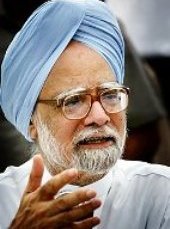 With consensus eluding climate talks, Prime Minister Manmohan Singh arrived in Copenhagen late on Thursday night with a message to preserve the areas of consensus on mitigation actions and finances and transfers of green technologies to developing countries enshrined in the Bali Action Plan.
With consensus eluding climate talks, Prime Minister Manmohan Singh arrived in Copenhagen late on Thursday night with a message to preserve the areas of consensus on mitigation actions and finances and transfers of green technologies to developing countries enshrined in the Bali Action Plan.
Prior to the meeting of over 110 world leaders at the climate change conference, Singh is scheduled to meet his Chinese counterpart Wen Jiabao in a bid to consolidate position of the developing countries for the plenary.
"The UNFCCC and its Kyoto Protocol embody the international agreed regime for addressing the global challenge of climate change," Singh had said in a statement before departing for Denmark.
The 12-day 15th conference of parties, which concludes in Copenhagen on Friday, is expected to issue a short communique on the need and urgency to arrest climate change instead of a political statement which could form a basis that could be the basis of a legally-binding agreement in the future.
US President Barack Obama, British Prime Minister Gordon Brown, French President Nicholas Sarkozy, are among the 110 leaders expected to attend the conference.
The developing countries have been resisting attempts by the rich nations to set aside the Kyoto Protocol, which sets legally binding greenhouse gas emissions reduction targets for the industrialised nations.
The 1997 protocol also has a strong compliance mechanism built in which penalises the rich nations if they do not meet emission reduction targets agreed upon by them.
The rich nations are expected to make a strong pitch for limiting the global temperature rise to two degrees Celsius, agreeing to achieve 80 per cent emission cuts by 2050 and push the developing countries to undertake strong mitigation actions which would see a significant deviation from the business as usual approach.
However, the above points do not mention a base year for from which the emission reductions would be undertaken but stresses on transparent verification actions for all the parties.
The group of four comprising Brazil, South Africa, India and China are expected to strongly oppose this proposal contending that it makes no reference to the UN Framework Convention on Climate Change, the Bali Action Plan and the Kyoto Protocol.
Though some countries have not ratified the Kyoto Protocol, the Bali Action Plan of 2007 and the UNFCCC were adopted by consensus and states. It asks nations not having ratified Kyoto to take commitments comparable to those agreed to it.
The prime minister is expected to stress precisely this point insisting that it was very important to preserve the areas of consensus and agree to continue negotiations based on the Bali Action Plan and the UNFCCC.
India and other developing countries have been insisting that neither would they take up legally binding emission cuts, nor accept a year by which their emissions would peak.
The BASIC countries have agreed to reduce the intensity of their emissions and indicated flexibility over agreeing to international review mitigation actions funded by international finances.
However, they do not agree any international review of their voluntary mitigation actions which are funded domestically. Till yesterday afternoon there was no consensus on an agreement.
The two negotiation groups -- Adhoc Working Group on Long Term Cooperative Actions and the AWG on Kyoto Protocol -- have submitted their reports with bracketted parts which are open to discussion.
It is unlikely that the COP-15 would be able to reach an agreement and negotiations are expected to continue next year. Denmark, the chair of the conference is understood to have prepared a three-page draft on broad consensus.
The Copenhagen summit is meant to agree a global climate deal, as a basis for agreement on a full treaty next year, intended to avoid dangerous climate change and drive a shift to a greener global economy less dependent on fossil fuels.
Image: Prime Minister Manmohan Singh









